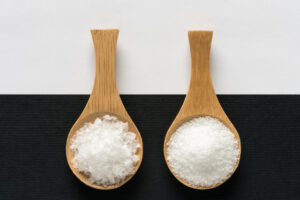Salt vs Sugar – Which is worse for your body and more important that you avoid? Learn more about how every meal you consume either contributes to health or sets the stage for potential health concerns.
In today’s fast-paced world, where convenience often takes precedence, our dietary choices have a profound impact on your overall well-being. What you eat plays a key role in shaping your health, energy levels, and longevity.
The salt vs sugar debate is not merely a matter of which of them you prefer, but more about the quantities you ingest because both salt and sugar are ingredients in your diet and found in almost every meal you eat.
Getting a good understanding of how they affect health is important because they hold the power to shape the destiny of your own health.
This article explores the factors contributing to salt vs sugar level intake, the health implications of overconsumption, and offers insights on how to make informed, conscious, healthier choices when it comes to salt and sugar consumption.
Table of Contents
Health Implications of Salt

Role of salt in the diet
Salt, or sodium chloride, is a key component of your diet. It is not just a seasoning for food but is a major mineral required by the body for various physiological functions.
Sodium is one of the essential electrolytes in your system and plays a key role in regulating fluid balance, nerve function, and muscle contractions. Without salt, the body would not be able to function properly.
Health Risks Associated with Excessive Consumption of Salt
Why is salt dangerous?
While salt is necessary for your well-being, the problem arises when you consume too much of it. Too much salt is usually associated with a range of health issues, including hypertension (high blood pressure), which is a significant risk factor for heart disease and stroke.
If your blood pressure is too high, the risk of heart attacks and strokes increases significantly. In addition, high salt consumption can contribute to fluid retention, which can strain the cardiovascular system and lead to edema.
Recommended Daily Salt Intake
Health experts recommend that adults limit their daily salt intake to about 2,300 milligrams (approximately one teaspoon of salt).
Unfortunately, many individuals exceed this limit due to the prevalence of processed and fast foods, which are often loaded with hidden salt.
For people with specific health conditions or those at risk of high blood pressure, the recommended daily intake may be even lower.
Sources of Dietary Salt
Salt is not just what you add to your meals at the table. It is frequently found in many processed foods, canned foods, and restaurant dishes.
Becoming mindful of these hidden sources of salt is essential for managing your daily intake. By understanding where your salt comes from, you can take steps to reduce your consumption and make healthier choices for your long-term well-being.
Health Implications of Sugar
Role of Sugar in the Diet
Sugar is another dietary component that holds a key place in our daily lives. It provides a quick source of energy, making it a desirable ingredient in many foods and beverages.
Natural sugars, like those found in fruits and dairy products, can offer essential nutrients. However, the sugar we often hear about in a negative context is added sugar, which includes sucrose and high fructose corn syrup.
These are the sugars added to processed foods and sugary drinks.
Health Risks Associated with Excessive Consumption of Sugar
Why is sugar dangerous?
Excessive sugar consumption has been linked to several health concerns. One of the most well-known issues is the increased risk of obesity. High sugar intake can lead to weight gain and obesity as it contributes to excess calorie consumption.
Additionally, a diet high in added sugars is associated with a higher risk of developing type 2 diabetes, heart disease, and dental problems. Sugar can also lead to energy crashes, mood swings, and cravings, affecting overall well-being.
Kidney failure, strokes, and heart attacks are are other possible conditions that can develop from eating excess sugar.
Recommended Daily Sugar Intake
Health organizations generally recommend limiting added sugar intake to no more than 10% of total daily calories. For most adults, this translates to about 50 grams (or roughly 12 teaspoons) of added sugar per day.
Children and teenagers, due to their lower calorie needs, should consume even less. For this reason, it is important when shopping, that you check food labels for added sugars and be aware of hidden sources, like sugary cereals and certain beverages.
Sources of Dietary Sugar
Added sugars can be found in a wide range of processed foods, including sugary snacks, sodas, fruit juices, and sweetened cereals.
It’s not just desserts that can be high in sugar content. Being aware of these sources and making informed choices when grocery shopping and dining out is necessary for managing sugar intake and promoting better health.
Health Implications of Salt vs Health Implications of Sugar
Which is more dangerous to health?
Is sugar more dangerous? Some experts believe that sugar is more dangerous because it can cause more issues and lead to more serious long-term health concerns.
Although some believe that sugar is worse for you than salt, note that both can cause issues if you eat too much. You must consume both salt and sugar in moderation and monitor your levels.
Direct Health Impact of Salt vs Sugar
Now that we have explored the individual roles of salt and sugar in your diet, let us now compare their health impacts.
Do not be mistaken, both salt vs sugar, when consumed in excess, can have detrimental effects on our health.
While salt is primarily linked to cardiovascular issues such as hypertension, sugar is often associated with weight gain, diabetes, and other metabolic problems.
Understanding the specific risks and consequences of overindulging in these substances will help you make informed choices.
Individual Differences and Dietary Needs
Recognize that not all individuals have the same dietary needs or risk factors. Tolerance for salt and sugar can vary greatly depending on factors like age, genetics, and existing health conditions.
Strategies for Reducing Salt vs Sugar Intake
Reducing the intake of salt and sugar does not mean sacrificing flavor or enjoyment in your meals. Let us consider some practical strategies to cut back on these dietary components without compromising taste.
3 tips stand out and will be discussed. Read food labels before buying, cook more at home, and making healthier choices when dining out.
Look for hidden sources of sugar and salt. You probably do not add extra sugar to your food all the time. The same thing may be true for salt. However, you may be getting both of them from hidden sources.
Prepackaged meals and snacks tend to be filled with high levels of sugar and salt. Manufacturers add them to improve the taste and flavor, but your health is affected.
Before you buy processed food such as delis, canned vegetables, or prepared meals, take time to read the label to see how much sugar and sodium is inside. You will be really surprised!
Beverages are another common source of too much salt and sugar. Have you stopped to consider what is inside your favorite drink?
Vegetable juices such as tomato juice tend to have a lot of sodium. On the other hand, fruit juices can be loaded with sugar. Once again, read the label!!
Restaurant and fast food meals also have a huge amount of salt and sugar. The companies do this to make you love their food and come back for more.
You may not realize how much is in the food because you cannot always get the ingredient list or see the full menu. Go ahead and ask them what is in your food! You will be more informed.
Balance the Pros and Cons of Salt and Sugar in Your Diet
Ultimately, the salt vs sugar debate is not about eliminating these substances entirely. It is about striking a balance that promotes health and well-being.
Making informed choices regarding salt and sugar consumption is a necessary step towards better overall health and a happier, more energetic life.
Another option to sugar is the use of artificial sweeteners. Again, make informed choices around this as well and do not go overboard because of the “zero calories” label!
Why We Crave Sugar and Salt
Why you think you crave sugar and salt? Many people find it hard to stop eating sugary or salty food.
Salty pretzels and chips or sugary soda and candy can be hard to avoid. They are both tempting and delicious, but they can wreak havoc with your diet.
You may be craving sugar and salt for several reasons. If you are dehydrated, you may crave salt. Your muscles may also be craving salt.
On the other hand, if you have not eaten in hours or are starving, you may crave sugar. The brain can also crave sugar too.
Conclusion – Salt vs Sugar
Limiting your sugar and salt intake is essential for your health. However, eating too much sugar may hurt you even more than having too much salt.
If you are worried about negative health effects from the amount of sugar and salt you consume, consult your doctor for safe amounts.
You may have heard the debates about sugar and salt. Which one is worse for your body and more important to avoid? The key is moderation for both sugar and salt, but research shows that sugar may be slightly worse than salt.
Related Articles
- How Safe Are Artificial Sweeteners? – The Truth About Them
- Health Risks of Artificial Sweeteners – Why They are Important
- How to Calm an Overactive Bladder – Best Foods
- 10 Common Causes of Stomach Bloating and How to Relieve Them
- Are Any Artificial Sweeteners Safe ? Look at Stevia Long Term
- Are Artificial Sweeteners Safe for Diabetics? Know the Facts
- The Side Effects of Artificial Sweeteners – How to Avoid Them
FAQ
Is salt worse than sugar for your health?
Both can be harmful in excess. Salt can increase blood pressure and risk of heart disease, while sugar contributes to obesity and diabetes. Moderation is key for both.
Which should I cut down on, salt or sugar?
It depends on individual health goals. Cutting down on both is ideal, but prioritize based on personal health conditions and dietary habits.
Can I replace salt with sugar, or vice versa?
Substituting one for the other isn’t recommended. Instead, focus on reducing overall intake of both and incorporating healthier alternatives like herbs, spices, and natural sweeteners in moderation.
What are the health implications of sugar?
Excessive sugar intake can lead to weight gain, diabetes, and increased risk of heart disease. It contributes to inflammation, tooth decay, and may impact mental health, energy levels, and skin health.
What are the health implications of salt?
Consuming too much salt can elevate blood pressure, increasing the risk of heart disease and stroke. It may also contribute to kidney problems, water retention, and bone health issues, especially in susceptible individuals.



